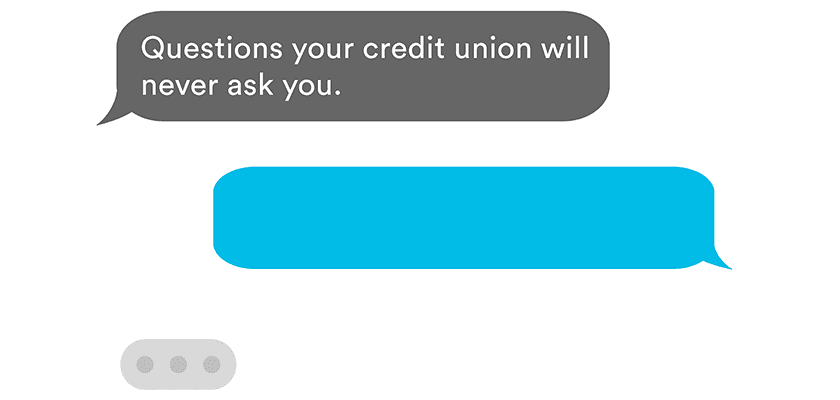Categories

Now more than ever, scammers are breaching the personal information of people by posing as their financial institution. In fact, the Federal Trade Commission claims that bank impersonation texts were the number one text scam throughout 2022. Accounting for more than $330 million in losses in 2022 alone, text message scams impact consumers more now than ever largely due to the fact that most everyone has a mobile device in their pocket.
While these numbers can be scary, you don’t have to live in fear when you know what to look out for to protect yourself and your personal information! Throughout this article, we’ll explore more about these scams and address a few questions that your credit union will never ask you over the phone or through text.
THROUGH TEXT OR EMAIL, YOUR CREDIT UNION WILL NEVER ASK YOU TO SEND:




YOUR CREDIT UNION WILL NEVER ASK YOU TO:
- Open or download an attachment from an unfamiliar number or email.
- Click on a link or type a URL from an unfamiliar number or email.
- Fill out a form from an unfamiliar number or email.
- Transfer funds to yourself using services like Zelle, CashApp, PayPal, and Venmo to reverse or cancel fraudulent withdrawals.
If you receive an email or text message that seems to be from your credit union that asks you to do anything listed above, stop and research! Any text or email containing any of the above is a red flag and it is always better to be safe than sorry when it comes to protecting your personal information and your financial information.
If you receive a text or email that asks for any of the above, we suggest you:
- Do not respond or click on any links or attachments.
- Reach out to your financial institution and inform them of the message.
- Delete the message and block the contact if you believe it is truly a scam.
TIPS TO AVOID SCAMS
- LOOK AT WHO IS SENDING THE EMAIL OR TEXT
One of the simplest ways to identify whether a text or email is a scam is by looking at the email address or phone number it is coming from. If you do not recognize the contact, consider finding out a bit more about the person behind the message before responding or clicking on any link or attachment.
One red flag to look out for when it comes to emails is misspelled words. Often scammers will attempt to replicate the name of a business or organization to gain your trust which encourages you to take their message to heart. If you receive an uncharacteristic email from your credit union, it could be a good idea to look closely at the email address it came from and speak to a verified employee to confirm the email came from someone at the organization.
2. IF YOU ARE SUSPICIOUS OF ANY TEXT OR EMAIL, CONTACT YOUR CREDIT UNION DIRECTLY!
If you happen to be suspicious of any message you receive, go ahead and contact your financial institution! You should be able to explain the situation and be given more information on the message you received if it was a real message from your credit union.
Remember, it’s always better to be safe than sorry!
3. PROTECT YOUR PERSONAL INFORMATION
Your credit union will never ask you to share your personal information through text or email. While you may be asked security questions, your PIN, your member number, or other verification information on the phone, you should never share these pieces of information through email or text that isn’t secure!
If you ever receive a message that seems to be from your credit union asking you to share any of this information, consider calling your credit union and letting a representative know.
If you receive a message that seems to be from Spero Financial that asks you to share your personal information, click on an unknown link/attachment, or asks you to fill out any unfamiliar form, stop and contact us! Do not share your online banking log in, account number, or PIN through any text or email.
If you believe that you or a loved one has become the victim of fraud, contact us or stop by your local branch so we can talk with you about the next steps. In the meantime, check out this checklist that walks you through recommended steps to report the fraud and protect yourself from further loss.



